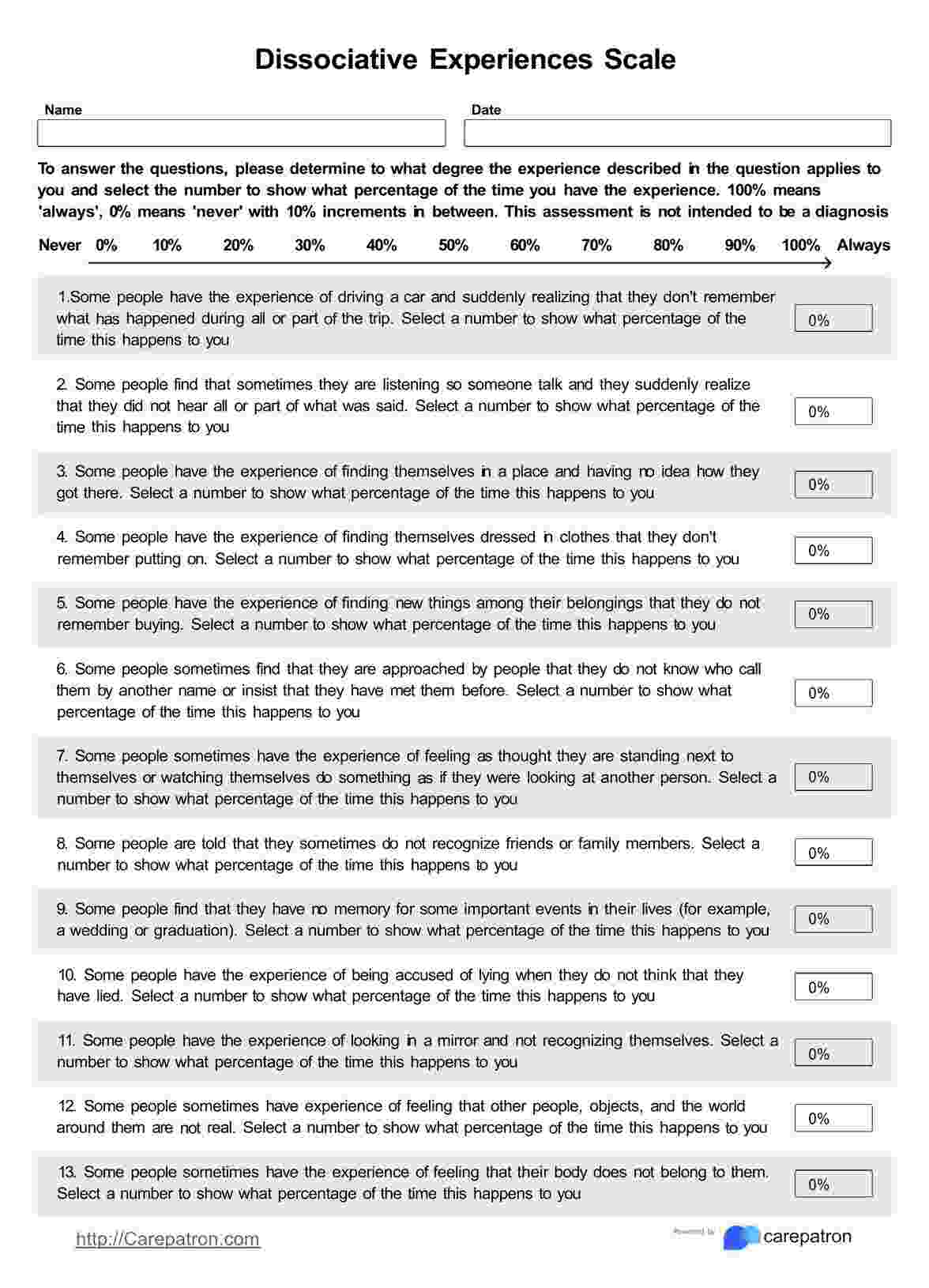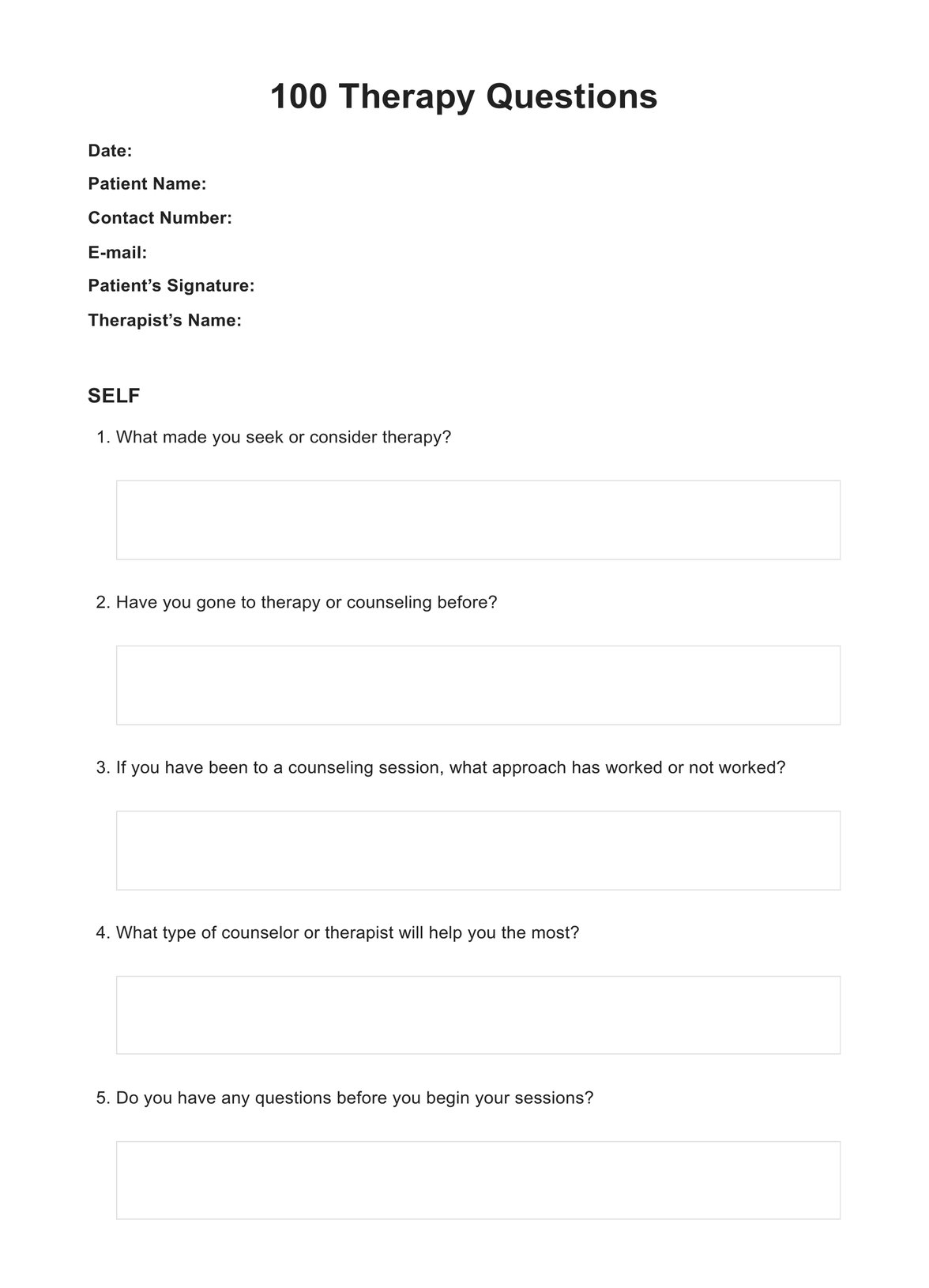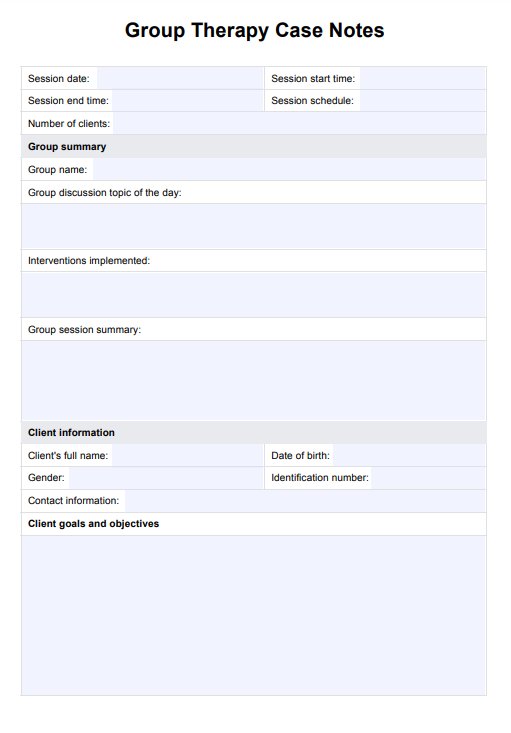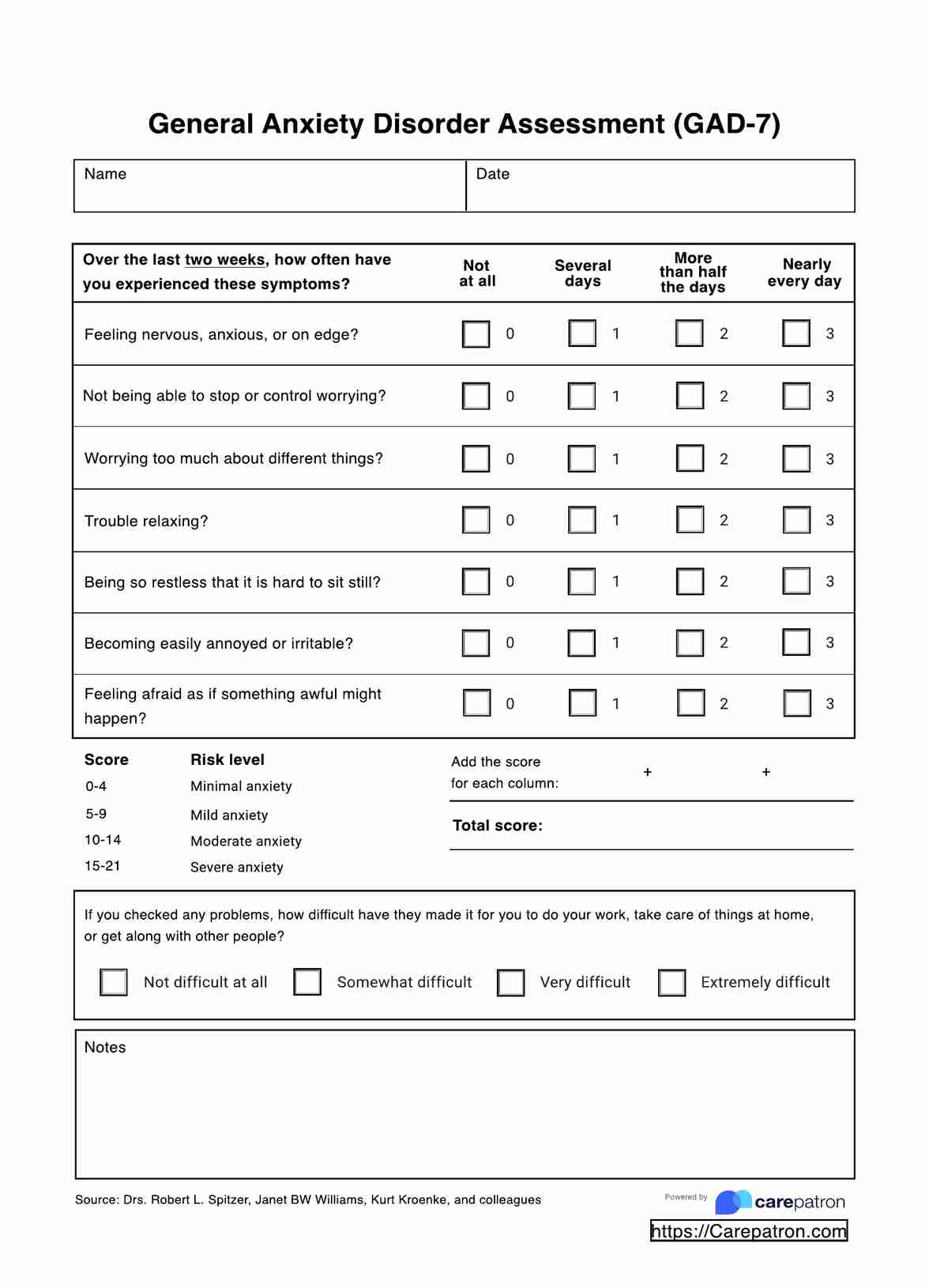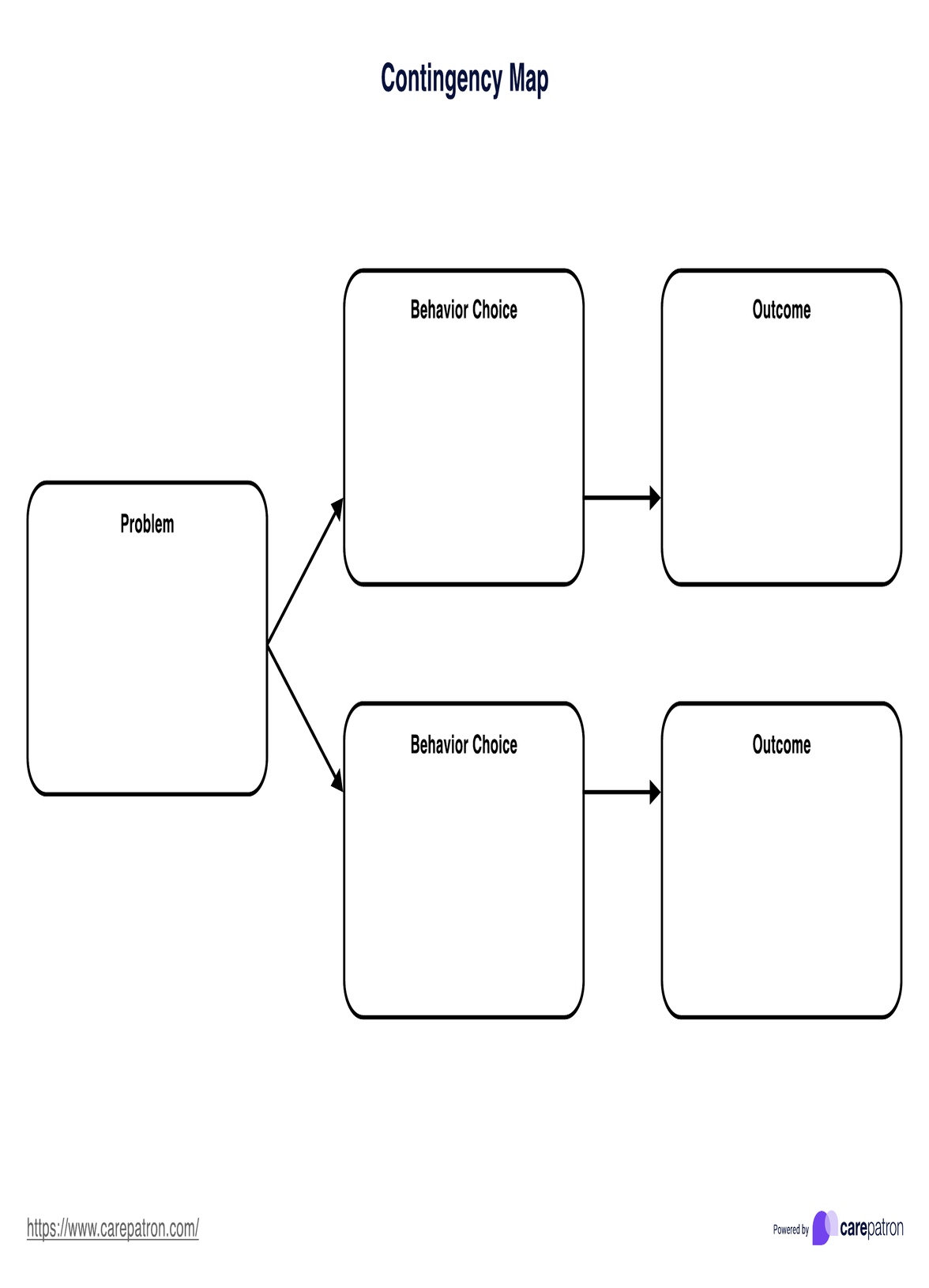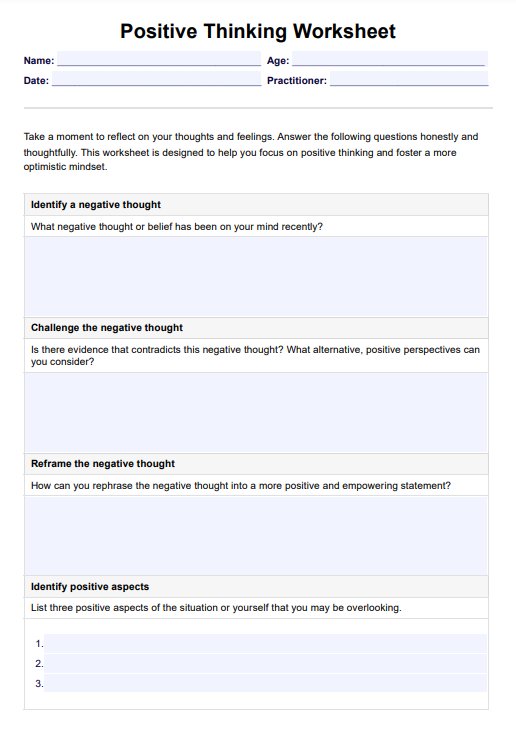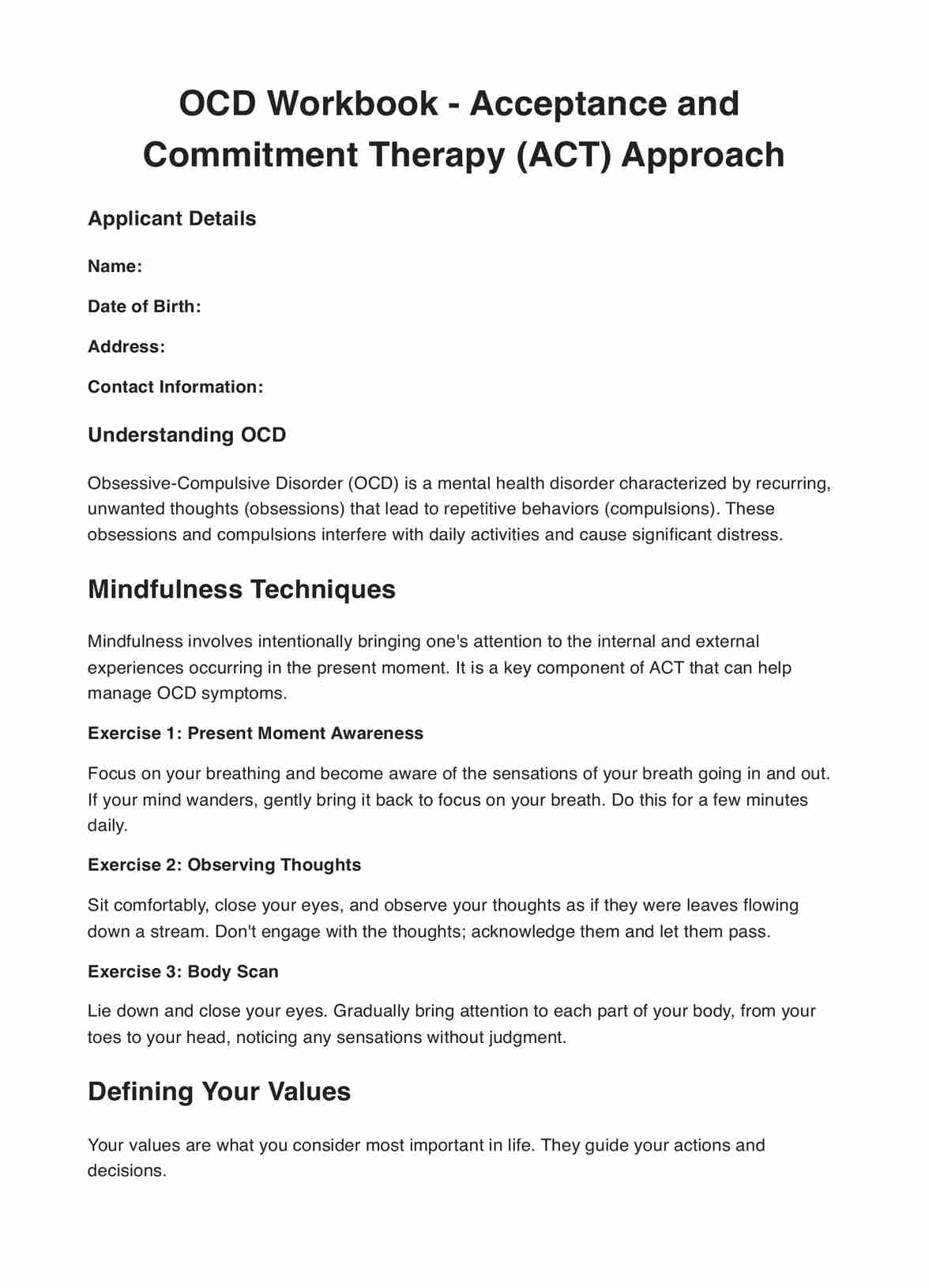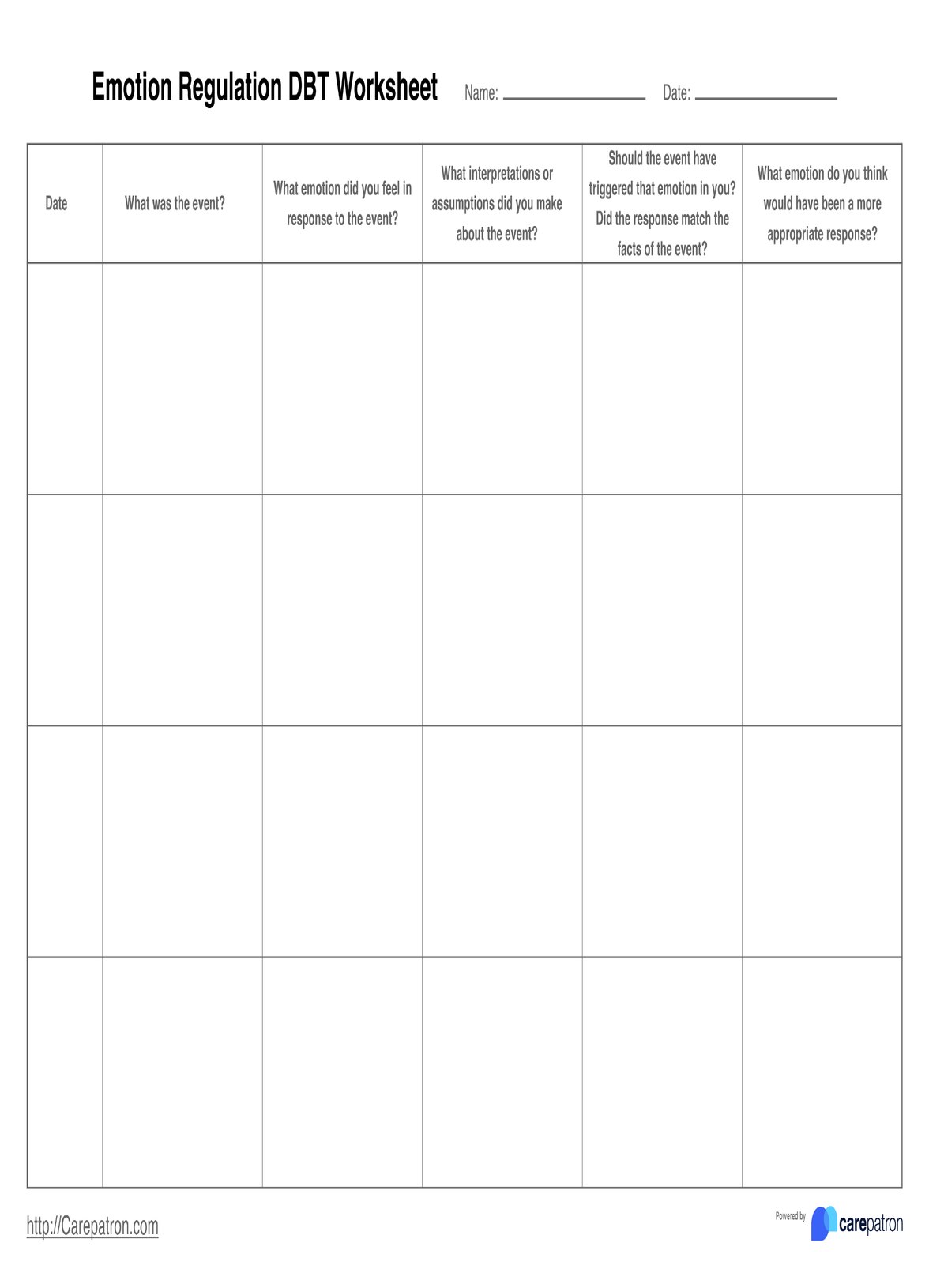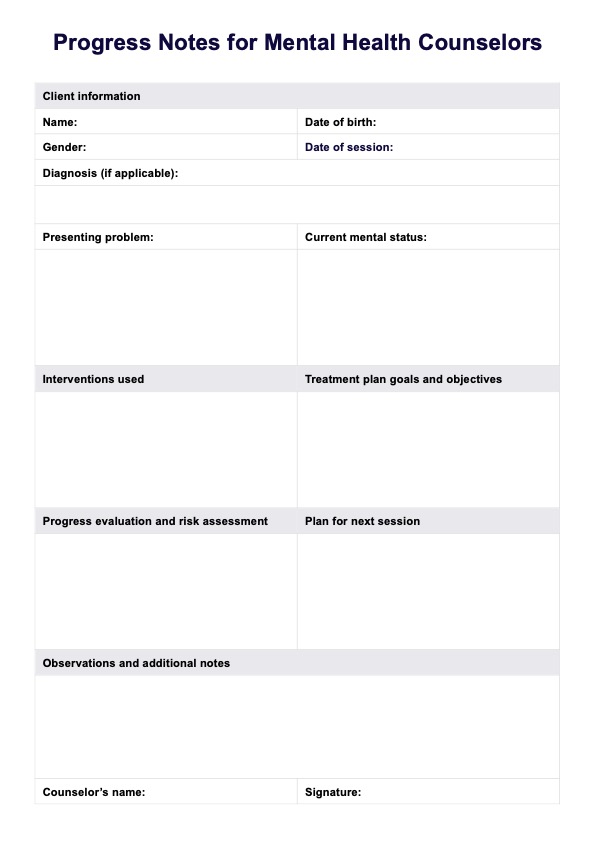Change Plan Worksheet
Explore our Change Plan Worksheet, a vital tool for addiction recovery and mental health, aiding clients in creating structured, personal change strategies.


What is a Change Plan Worksheet?
A Change Plan Worksheet is a valuable tool in mental health and addiction counseling. It is designed to assist individuals in plotting their path toward recovery or personal development.
This worksheet aids in identifying critical areas of life needing change, establishing specific goals, and formulating strategies to achieve them. It proves particularly beneficial in addiction recovery, offering a structured approach to creating actionable change.
The worksheet typically includes sections detailing reasons for change, setting short- and long-term objectives, recognizing potential challenges, and planning for support and resources. By segmenting the recovery process into achievable steps, the Change Plan Worksheet helps individuals stay focused and motivated, allowing them to monitor their progress effectively over time.
Change Plan Worksheet Template
Change Plan Worksheet Example
Why is planning important for recovery?
Planning plays a pivotal role in the journey of recovery, particularly for individuals dealing with addiction. A structured plan provides a clear roadmap, guiding them through the often challenging process of overcoming addictive behaviors and rebuilding their lives.
A well-constructed plan, incorporating elements of smart recovery, helps to:
- Set clear goals: Planning allows individuals to establish clear, achievable goals. For those in addiction recovery, goals might include attending therapy sessions regularly, avoiding triggers, or rebuilding damaged relationships.
- Develop coping strategies: Effective planning includes developing strategies to deal with potential relapses or stressful situations. Having these strategies in place is crucial for maintaining progress in recovery.
- Enhance motivation: A plan is a constant reminder of the reasons for seeking recovery and its benefits. This reinforcement is vital in keeping individuals motivated, especially during difficult times.
- Provide structure: Recovery from addiction can leave patients overwhelmed, but breaking down the process into smaller steps makes the journey seem less daunting and more organized. A plan breaks down the process into manageable steps, making the journey seem less daunting and more organized.
- Measure progress: Plans allow for tracking progress, which is essential for both motivation and adjustment of strategies. Seeing tangible improvements can be incredibly encouraging for someone in recovery.
- Facilitate support: A recovery plan often involves identifying support systems, such as family, friends, support groups, or healthcare professionals. Knowing who to turn to in times of need is vital for sustained recovery.
In essence, planning is an indispensable component of recovery from addiction. It brings clarity, focus, and a sense of control to what can otherwise be an unpredictable and challenging journey.
Signs and symptoms someone needs help during their recovery journey
Identifying signs and symptoms that someone needs additional support during their recovery journey, especially from addiction, is crucial. Mental health professionals can play a significant role in recognizing these indicators. Here are some key signs and symptoms:
Withdrawal from social activities
Individuals in recovery may withdraw from social interactions or activities they previously enjoyed. This withdrawal can be a sign of struggling with the recovery process or relapse.
Changes in mood or behavior
Significant mood swings, increased irritability, or behavioral changes such as aggression or secrecy can indicate that an individual is finding it hard to cope with the recovery process.
Neglecting self-care
Neglecting personal hygiene, diet, or other aspects of self-care can be a red flag. It may suggest a lack of motivation or a decline in mental health, which is common in recovery phases.
Increased stress or anxiety
Experiencing heightened levels of stress or anxiety, particularly in situations related to addiction triggers, can be a sign that an individual needs more support to manage their recovery effectively.
Talking about or glamorizing past substance use
If an individual frequently reminisces about past substance use or romanticizes those periods, it may indicate a longing or temptation to return to addictive behaviors.
Physical health decline
Noticing a decline in physical health, such as unexplained weight loss or gain, fatigue, or other health issues, can be a symptom of struggling with recovery.
Missing appointments or therapy sessions
Skipping scheduled therapy sessions, support group meetings, or medical appointments is often a sign of a wavering commitment to the recovery process.
Recognizing these signs early, especially when they point to large problems, and intervening can provide the necessary support to prevent relapse and ensure continued progress on the path to recovery. Healthcare professionals must maintain open communication and offer a non-judgmental, supportive environment for individuals during this challenging journey.
How to use this worksheet
The Change Plan Worksheet is a valuable tool for mental health professionals to guide patients through their recovery journey. Here’s how to effectively use the worksheet:
Step 1: Introduce the worksheet
Begin by explaining the purpose of the Change Plan Worksheet to your patient on their visit. Emphasize its role in helping them identify and articulate their goals, obstacles, and strategies for change, particularly in addiction recovery.
Step 2: Guide through goal setting
Assist your patient in defining clear, achievable goals once they have identified their goals. These might include managing symptoms, improving coping strategies, or reducing harmful behaviors. Encourage them to be specific about what they want to accomplish.
Step 3: Identify obstacles and triggers
Help your patient recognize potential obstacles and triggers that could hinder their progress. This step is crucial in addiction recovery, as it involves helping patients discover situations or emotions that may lead to relapse.
Step 4: Develop coping strategies
Collaborate with your patient to develop effective coping strategies. This might involve techniques for stress management, ways to avoid triggers, or actions to take when facing challenges.
Step 5: Establish support systems
Encourage the patient to list support systems they can rely on. This may include family members, friends, support groups, or professional help. Having a robust support network is vital for sustainable recovery.
Step 6: Review and revise regularly
Regularly review the worksheet with your patient to track progress and make necessary adjustments. Recovery is a dynamic process, and the plan may need to evolve to accommodate changes in the patient's life and circumstances.
By guiding patients through these steps, mental health professionals can help them create a structured and personalized plan for change. This worksheet not only aids in setting clear recovery goals but also empowers patients to take active steps toward achieving them.
The benefits of using this worksheet
Implementing the Change Plan Worksheet in mental health and addiction counseling offers several key benefits. These advantages support the healthcare professional and the patient's efforts throughout the recovery journey. Here are some of the primary benefits:
- Personalized recovery plans: The worksheet enables the creation of individualized recovery plans tailored to each patient's unique needs and circumstances. It helps set specific, achievable goals and provides a clear roadmap for the recovery process.
- Enhanced patient engagement: The worksheet fosters greater engagement and ownership, harnessing the power of actively involving patients in their recovery journey. This involvement often leads to higher motivation and commitment to the plan.
- Improved coping strategies: The worksheet encourages patients to identify potential triggers and develop effective coping strategies. This proactive approach helps in managing challenges and preventing relapse.
- Facilitates progress tracking: Using the worksheet allows for systematic monitoring of progress toward goals. It helps identify areas of improvement and adjust the plan as needed, ensuring the recovery process remains dynamic and responsive.
- Strengthens therapeutic alliance: The collaborative nature of filling out the worksheet strengthens the therapeutic relationship. It fosters trust and open communication between the patient and the healthcare professional, which is crucial for effective therapy.
The Change Plan Worksheet is a valuable tool for mental health and addiction recovery. It aids in creating structured, personalized plans vital for successful recovery, enhancing patient engagement, and strengthening the therapeutic process.
Other useful resources for addiction recovery
In addiction recovery, a variety of resources can provide significant support and guidance. These resources complement tools like the Change Plan Worksheet and can enhance the recovery experience. Here are some valuable resources that can aid in addiction recovery:
Support groups and meetings
Support groups, such as Alcoholics Anonymous (AA) or Narcotics Anonymous (NA), offer a community of individuals sharing similar experiences. These meetings provide a space for sharing, understanding, and mutual support, which can be incredibly beneficial during recovery.
Individual therapy
Engaging in individual therapy with a mental health professional can help address underlying issues related to addiction. Therapies like Cognitive Behavioral Therapy (CBT) and Dialectical Behavior Therapy (DBT) are particularly effective in managing addictive behaviors and developing healthier coping mechanisms.
Educational resources
Books, websites, and online courses that provide information about addiction and recovery can be helpful. Resources that offer insights into the nature of addiction, coping strategies, and personal stories of recovery can be both informative and inspiring.
Wellness and self-care activities
Activities that promote overall well-being, such as exercise, meditation, and healthy eating, can be crucial in recovery. Engaging in hobbies and interests that bring joy and relaxation can also help maintain sobriety.
Medication-Assisted Treatment (MAT)
For some individuals, medication-assisted treatment can be an effective part of the recovery process. Medications like methadone, buprenorphine, or naltrexone, used in conjunction with counseling and behavioral therapies, can provide a comprehensive approach to treating substance use disorders.
Outpatient and residential programs
Depending on the severity of the addiction, outpatient or residential treatment programs can offer structured and intensive care. These programs often include a combination of therapy, group sessions, and other activities to aid recovery.
Online forums and communities
Online platforms can provide an additional layer of support, especially for those who might not have access to in-person resources. Forums and communities allow individuals to connect, share experiences, and seek advice in a more accessible format.
Utilizing a combination of these resources can significantly enhance the recovery process. They provide diverse forms of support, education, and treatment that can be tailored to individual needs, contributing to a more holistic and practical approach to overcoming addiction.
Commonly asked questions
A change plan worksheet is a tool used in therapy, especially addiction counseling, to help clients identify their goals, motivations, barriers, and strategies for change. It outlines a personal plan for making meaningful life changes.
The stages of change in recovery include pre-contemplation (not recognizing the need for change), Contemplation (considering the possibility of change), Preparation (planning for a change), Action (actively making changes), and Maintenance (sustaining the change and avoiding relapse).
The preparation stage of change is when an individual recognizes the need for change and plans to make those changes. It involves setting goals, gathering resources, and preparing mentally and emotionally for the change process.


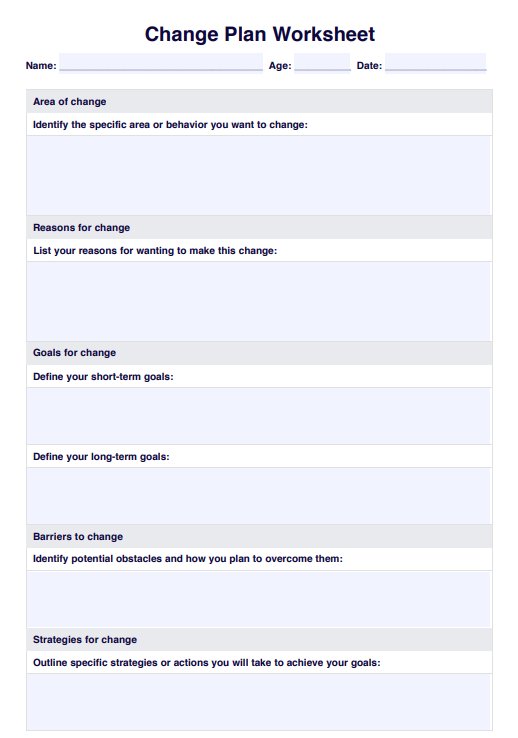
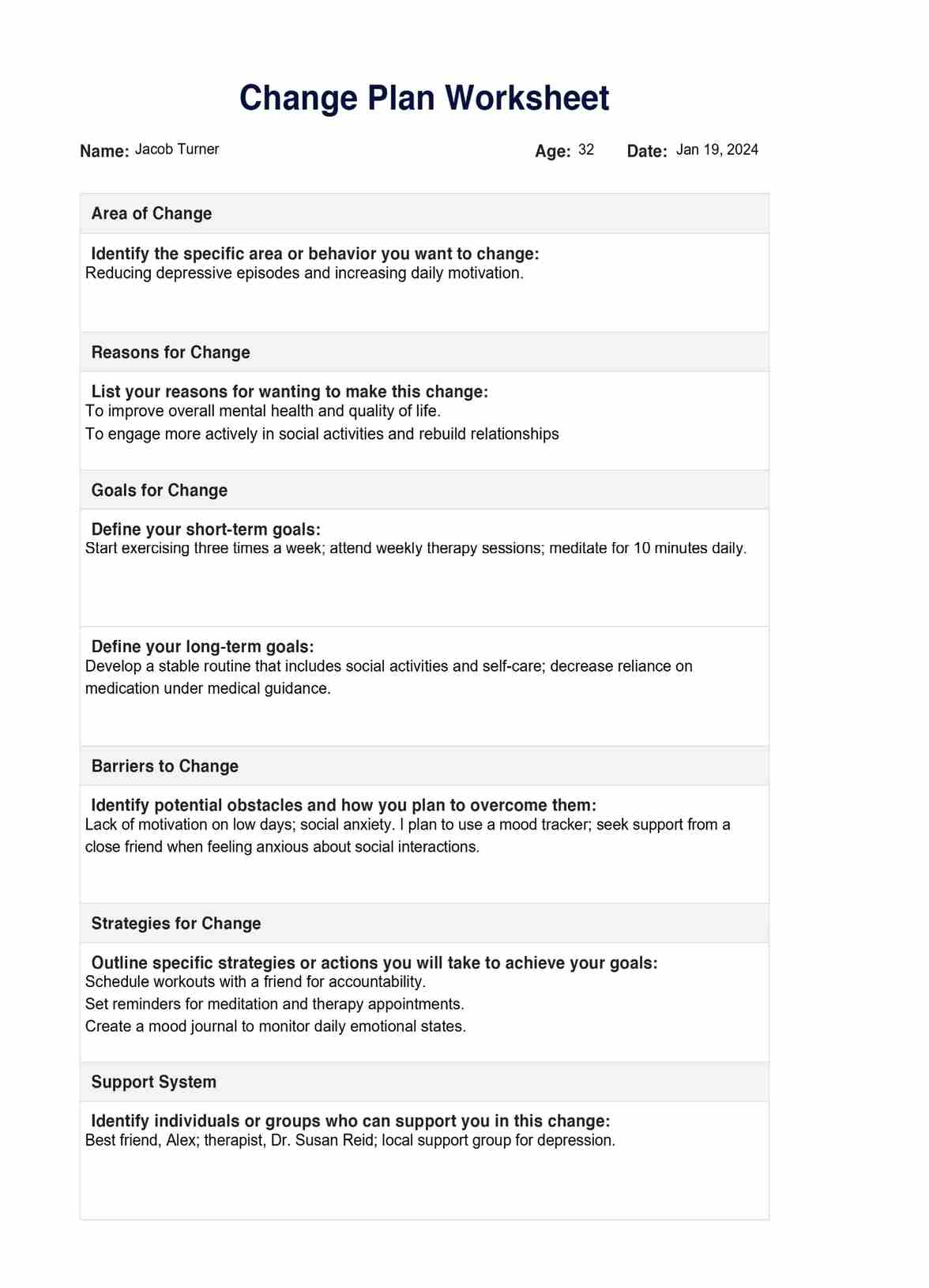

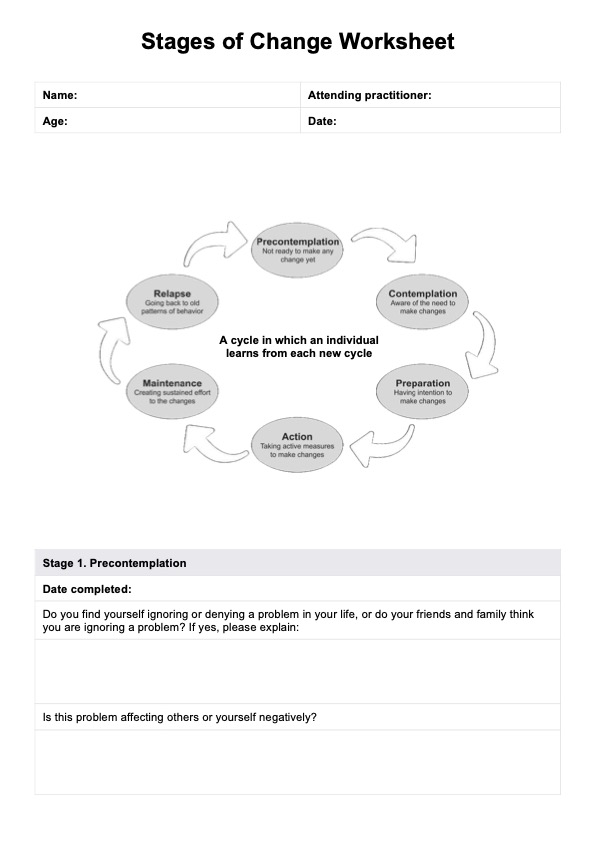
















-template.jpg)



















































































